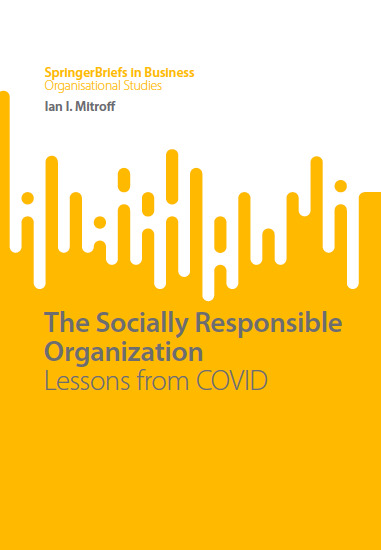Ian I. Mitroff – credited with being one of the founders of the modern field of Crisis Management – explores social responsibility as an organizing principle.

The Socially Responsible Organization
BERKELEY, Calif. – June 6, 2022 – PRLog — Inspired by the arguments and claims that emerged alongside the global crisis caused by Covid-19, Ian Mitroff has written an extended analysis of THE SOCIALLY RESPONSIBLE ORGANIZATION (Springer; June 6, 2022; $37.99 paperback; ISBN: 303099807X). By surfacing and scrutinizing today’s most critical arguments along with sharing thought-provoking reflections, Mitroff arms readers with the ideas and arguments to help them lead to a more socially responsible future.
Dr. Mitroff specifically explores the role of crisis management in creating a socially responsible organization and applies the Myers-Briggs Personality Typology (MBPTI) and the Thomas-Kilmann (TKI) Conflict Framework to such issues as the regulation of tech companies, dis-information vs. misinformation, and responses to the pandemic. Throughout the book, Mitroff imparts the skills necessary to cope with a complex and messy world by persuasively and passionately discussing:
– The top 11 reasons given for not getting vaccinated, taking on their validity and how to refute them one-by-one.
– How the unreasonable arguments and claims of individuals can all too easily take hold and thrive in self-reinforcing argument clusters – the Hoax Cluster, Conspiracy/Paranoia Cluster, I Know Best Cluster, Invulnerability Cluster, and the Defect Cluster.
– The four different personality perspective types and how they compete and align with each other to support different ideas, including the infrastructure debate and the polarization of everything.
– Regulating tech is only half the job. We need technologists with an equally deep understanding and appreciation of the Humanities and Social Sciences working in tech.
– Socially responsible organizations require transdisciplinary-
– Recognizing misinformation vs. dis-information, whereas misinformation is supposedly unintentional, and disinformation is deliberately intentional.
– Compromise is key to our learning to live together; the resolution of key issues is not possible without compromise.
– Dealing with “Wicked Messes” by using critical thinking skills, surfacing and rebutting fallacious arguments and claims.
– No crisis is ever a single crisis. The need to act systematically – expansively – is an absolute requirement to stand any chance of coping with the most diverse array of crises.
Mitroff lists the major arguments given in regards to these issues, and subjects them to the strongest possible scrutiny and critique to hold both individuals and organizations accountable to the larger responsibilities we share as global citizens.
ABOUT THE AUTHOR:
Ian I. Mitroff is regarded as the founder of the discipline of Crisis Management. He is currently a Senior Research Affiliate at the Center for Catastrophic Risk Management, University of California, Berkeley, and is Professor Emeritus from the Marshall School of Business and the Annenberg School of Communication, University of Southern California. He is a Fellow of the American Psychological Association, the American Association for the Advancement of Science, and the American Academy of Management. Known for his thinking and writing on a wide range of business and societal issues, Dr. Mitroff has published hundreds of articles and more than 40 books. He has a BS, MS, and a PhD in Engineering and the Philosophy of Social Systems Science from University of California, Berkeley.
ABOUT THE BOOK:
Title: The Socially Responsible Organization (http://www.amazon.com/
Subtitle: Lessons From Covid
Author: Ian I. Mitroff
Publisher: Springer
Publication Date: June 6, 2022
